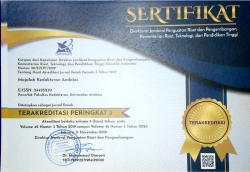CORRELATION BETWEEN COGNITIVE FUNCTION AND SERUM LEVELS OF TUMOR NECROSIS ALPHA (TNF-α) IN SCHIZOPHRENIA
Abstract
Introduction: Impaired cognitive function causes significant impairment in schizophrenic patients. Studies result found that inflammatory processes in the brain play an important role in cognitive decline in schizophrenia. One of the inflammatory markers associated with cognitive function in schizophrenia is serum Tumor Necrosis Factor Alpha (TNF-α) levels. TNF-α levels can be influenced by genetic and racial factors. Objective: This study aims to analyze the correlation between cognitive function and TNF-α serum levels in schizophrenic patients in Indonesia. Methods: This study is an analytical study using a cross-sectional design in 34 schizophrenic patients who were hospitalized in the Mental Hospital of West Java Province. Patients with risk of inflammation and cognitive impairment are excluded. Cognitive function was assessed using the Rey Auditory Verbal Learning Test (RAVLT), Digit Span and Trail Making Test. TNF-α serum levels were measured using the Sandwitch-ELISA (Enzyme-linked Immunosorbent Assay) method. Results: Study participants showed a cognitive deficit in all examination instruments. The TNF-α serum levels of the participants increased (mean: 8.93 ± 3.43). TNF-α serum levels was not significantly correlated with cognitive function. Conclusion: There is no significant correlation exist between cognitive function and TNF-α serum levels in schizophrenia.
Keywords: Schizophrenia, cognitive function, TNF-α
Full Text:
PDFReferences
Sadock B, Sadock V, Ruiz P. Kaplan and Sadock’s Synopsis of Psychiatry: Behavioral Sciences/Clinical Psychiatry. 11th ed. Wolter Kluwer; 2015.
Kupfer D. The American Psychiatric Publishing Textbook of Psychiatry. 6th ed. American Psychiatric Pub; 2014.
Riset Kesehatan Dasar. Hasil Utama Riskesdas 2018. Kementrian Kesehat Republik Indones. Published online 2018:1-100. doi:1 Desember 2013
World Health Organization (WHO). Schizophrenia. Published 2019. https://www.who.int/mental_health/management/schizophrenia/en/
Winn H, Youmans J. Youmans and Winn Neurological Surgery. 7th ed. Elsevier; 2017.
Shmukler A, Gurovich I, Agius M, Zaytseva Y. Long-term trajectories of cognitive deficits in schizophrenia: A critical overview. Eur Psychiatry. 2015;30(8):1002-1010.
Harvey P, Bowie C. Cognitive enhancement in schizophrenia: pharmacological and cognitive remediation approaches. Psychiatr Clin. 2012;35(3):683-698.
Mihaljevic-Peles A, Bajs Janovic M, Sagud M, Zivkovic M, Janovic S, Jevtovic S. Cognitive deficit in schizophrenia: an overview. Psychiatr Danub. 2019;31(2):139-142.
Stahl S. Stahl’s Essential Psychopharmacology: Neuroscientific Basis and Practical Applications. 4th ed. Cambridge university press; 2013.
Fineberg A, Ellman L. Inflammatory cytokines and neurological and neurocognitive alterations in the course of schizophrenia. Biol Psychiatry. 2013;73(10):951-966.
Girgis R, Kumar S, Brown A. The cytokine model of schizophrenia: emerging therapeutic strategies. Biol Psychiatry. 2014;75(4):292-299.
Na K, Jung H, Kim Y. The role of pro-inflammatory cytokines in the neuroinflammation and neurogenesis of schizophrenia. Prog Neuropsychopharmacol Biol Psychiatry. 2014;3(48):277-286.
Kogan S, Ospina L, Kimhy D. Inflammation in individuals with schizophrenia–Implications for neurocognition and daily function. Brain Behav Immun. 2018;74:296-299.
Moradi E, Hallikainen I, Hänninen T, Tohka J. Rey’s Auditory Verbal Learning Test scores can be predicted from whole brain MRI in Alzheimer’s disease. NeuroImage Clin. 2017;13:415-427.
Schmidt M. Rey Auditory Verbal Learning Test: RAVLT : A Handbook.Western Psychological Services.; 1996.
Manglam M, Das A. Verbal learning and memory and psychopathology in schizophrenia. Asian J Psychiatr. 2013;6(5):417-420.
Laere E, Tee S, Tang P. Assessment of Cognition in Schizophrenia Using Trail Making Test: A Meta-Analysis. Psychiatry Investig. 2018;15(10):945-955.
Keefe R, Harvey P. Cognitive impairment in schizophrenia. Handb Exp Pharmacol. 2012;213:11-37.
Bhattacharya K. Cognitive function in schizophrenia: A review. J Psychiatry. 2015;18(1):14-78.
Harvey P, Isner E. Cognition, Social Cognition, and Functional Capacity in Early-Onset Schizophrenia. In: Child and Adolescent Psychiatric Clinics. ; 2019.
Fujii K, Yoshihara Y, Matsumoto Y, et al. Cognition and interpersonal coordination of patients with schizophrenia who have sports habits. PLoS One. 2020;5(11).
Kim Y, Myint A, Verkerk R, Scharpe S, Steinbusch H, Leonard B. Cytokine changes and tryptophan metabolites in medication-naïve and medication-free schizophrenic patients. Neuropsychobiology. 2009;59(2):123-129.
Pandey G, Ren X, Rizavi H, Zhang H. Proinflammatory cytokines and their membrane-bound receptors are altered in the lymphocytes of schizophrenia patients. Schizophr Res. 2015;164(1-3):193-198.
Lv M, Tan Y, Yan S, et al. Decreased serum TNF-alpha levels in chronic schizophrenia patients on long-term antipsychotics: correlation with psychopathology and cognition. Psychopharmacology (Berl). 2015;232(1):165-172.
Akiyama K, Saito S, Saito A, et al. Predictive value of premorbid IQ, negative symptoms, and age for cognitive and social functions in Japanese patients with schizophrenia: A study using the Japanese version of the Brief Assessment of Cognition in Schizophrenia. Psychiatry Res. 2016;246:663-671.
Ohi K, Shimada T, Kataoka Y, et al. Intelligence decline between present and premorbid IQ in schizophrenia: Schizophrenia Non-Affected Relative Project (SNARP). Eur Neuropsychopharmacol. 2019;29(5):653-51.
Mohn C, Sundet K, Rund B. The relationship between IQ and performance on the MATRICS consensus cognitive battery. Schizophr Res Cogn. 2014;1(2):96-100
Sathienluckana T, Unaharassamee W, Suthisisang C, Suanchang O, Suansanae T. Anticholinergic discontinuation and cognitive functions in patients with schizophrenia: a pharmacist-physician collaboration in the outpatient department. Integr Pharm Res Pract. 2018;7(161-171).





















